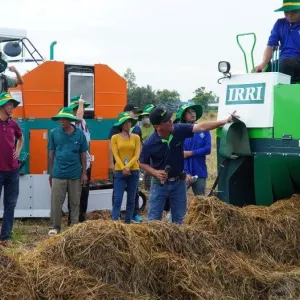Showcasing rice straw innovations for farmers in Vietnam’s Mekong River Delta
To promote the mechanization of rice straw collection and rice straw handling and processing technologies, the Ministry of Agriculture and Rural Development (MARD) of Vietnam, in cooperation with Hau Giang province and the International Rice Research Institute (IRRI), organized a field demonstration on rice straw management towards circular and low emission agriculture. More than 500 participants, including rice farmers from

Showcasing rice straw innovations for farmers in Vietnam’s Mekong River Delta
To promote the mechanization of rice straw collection and rice straw handling and processing technologies, the Ministry of Agriculture and Rural Development (MARD) of Vietnam, in cooperation with Hau Giang province and the International Rice Research Institute (IRRI), organized a field demonstration on rice straw management towards circular and low emission agriculture. More than 500 participants, including rice farmers from the provinces of the Mekong River Delta (MRD), attended the field demonstration held in Vi Thuy district, Hau Giang province.
Various agricultural machinery companies and institutes participated in the event, like Giang Lan Company, Yanmar Vietnam, Tu Sang Company, Phan Tan Company, AiO Vietnam Company, Binh Dien Fertilizer, Green Farm Cooperative Can Tho City, and the Center for Research and Transfer of Science and Technology of Nong Lam University. They showcased a variety of technologies like rice straw balers for wet and dry fields and combine harvesters. They also demonstrated sustainable farming practices by presenting models of rice straw composting, mushroom production, organic farming using rice straw compost, bio bedding for livestock and cattle feed, and production of rice straw pots as a bioplastic alternative.
In his welcome message, MARD Vice Minister Tran Thanh Nam shared that different solutions to the issues of rice straw management will be introduced in the field demonstration event. He stressed that collecting and processing agricultural residues such as rice straw will add value to the rice value chain, contributing to income generation and livelihood improvement.
Vice Minister Nam also highlighted that creating added value from rice straw, instead of openly burning it, can help achieve the government’s commitment to reducing greenhouse gas (GHG) emissions in agriculture. He acknowledged that these efforts will contribute to the development of Vietnam’s proposed initiative on “Sustainable Development of One Million Hectares…

